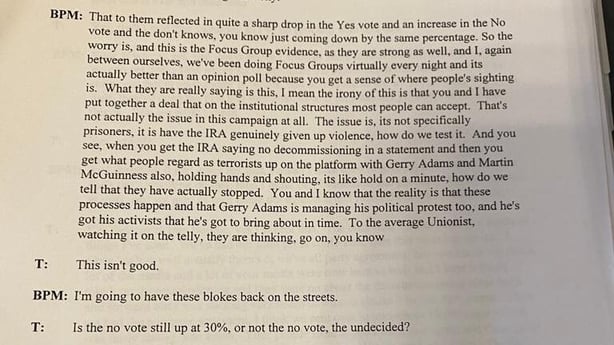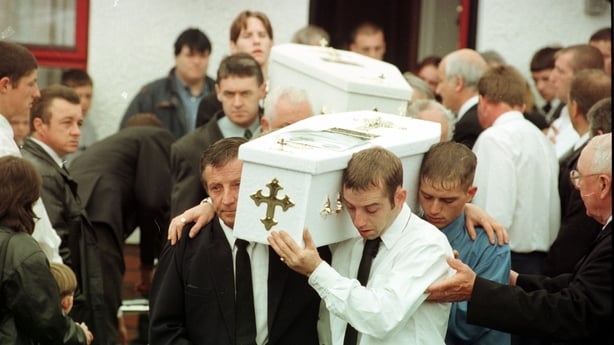By David McCullagh, Conor McMorrow and Justin McCarthy
Reaching an all-party agreement on Good Friday 1998 was an historic achievement; but implementing the document was to prove incredibly difficult, with progress threatened by unionist intransigence, Sinn Féin pandering to its republican base, and tensions over the contested march at Drumcree.
At one point, dealing with the latter problem, an exasperated Tony Blair told Bertie Ahern: "it is an offence against reason for this thing to destroy all the work that we have done". The same could be said of some of the other difficulties they faced in those months.
The first challenge was to secure an endorsement of the Good Friday Agreement in a referendum on 22 May. There was no doubt that the electorate in the south would back the deal in a vote on the same day (in the event, 94% voted yes). But the situation in Northern Ireland was not so clear cut.
In a phone call a few days before the vote, Blair told Ahern that he was worried that, while the referendum would be passed, it would not attract enough support in the unionist community.
Blair: My worry is that you get, let's say 60% Yes, OK, but say in the unionist community only 25% are supporting it.
Ahern: Yes, it’s not good enough.
Blair: If you get that, what Paisley will claim, is the only way for the 75% to make their voice heard is to back him…
The prime minister told the taoiseach that they had been doing focus group research nearly every night, and "the movement has been all one way, all going towards Paisley".

That movement had been turbo-charged by the controversial appearance at the Sinn Féin Ard Fheis of four IRA men – known as the Balcombe Street gang – on day release from Portlaoise Prison.
As Blair put it: "The sight of all of those blokes out there on the platform… I mean it sunk the Unionists… when you get the IRA saying no decommissioning in a statement and then you get what people regard as terrorists up on the platform with Gerry Adams and Martin McGuinness also, holding hands and shouting, it’s like, hold on a minute, how do we tell that they have actually stopped?"
Drumcree looms again
It was that issue – the IRA's commitment to peace – rather than what was in the actual agreement that was causing Blair to worry about the referendum vote.
"My anxiety is to slam the brakes on the bandwagon. If I could turn it around a bit, that would be tremendous."
In the event, the bandwagon was stopped, and the agreement was endorsed in the North with the support of 71% of those voting.
But public backing didn’t mean implementing the agreement was plain sailing. A few weeks after the referendum, Ahern wrote to Blair expressing "serious concern" at the way a number of decisions (on policing and on prisons) had been taken.
There was now, he said, "a real sense of alarm among Nationalists that some people in the [British] system are attempting to claw back parts of the Good Friday Agreement with which they do not agree."
It was a serious disagreement between the two governments – but such procedural spats were overshadowed by the looming confrontation over the Orange Order parade at Drumcree, by now an annual feature of Northern politics.
On 2 July, Blair told Ahern he had had a "pretty alarming conversation" with chief constable Ronnie Flanagan about preparations by loyalist paramilitaries for the annual stand-off: "He reckons that the people [involved]… are some sort of nut cases".
As widespread conflict seemed inevitable, the course of events was changed by yet another atrocity
The prime minister attempted to come up with a compromise that would allow the Orange Order to accept a different route, though he found it difficult to explain, confessing to the Taoiseach: "I got a bit confused when I was looking at the map".
Blair worried that the crowd could build up to 70,000 or 80,000, with the potential for people to be killed.
Ahern agreed on the dangers, saying that it wasn’t even a question of guns being used – somebody could be killed by a thrown brick, "then of course emotions just get out of control and that’s just what I would be worried about this weekend".
As widespread conflict seemed inevitable, the course of events was changed by yet another atrocity. In a mainly Protestant estate in Ballymoney, Co Antrim, loyalists threw a petrol bomb through the window of a house occupied by a Catholic family.

The Quinn brothers – Richard (11), Mark (9) and Jason (7) – who were asleep in bed when the bomb was thrown, died in the fire.
The murders created a wave of revulsion on all sides of the community, and the protest at Drumcree subsided.
At the end of the month, Blair mused to Ahern: "We managed to get through the Drumcree thing – with a bit of help from tragedy I’m afraid – but we did." More tragedy was just around the corner.
Based on documents now available to view in the National Archives of Ireland.

